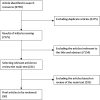Proposing an Emergency Medicine Ethical Guideline; a Qualitative Study
- PMID: 35072090
- PMCID: PMC8771154
- DOI: 10.22037/aaem.v10i1.1391
Proposing an Emergency Medicine Ethical Guideline; a Qualitative Study
Abstract
Introduction: Emergency medicine physicians face major ethical challenges in their practices. Furthermore, they need to be aware of the principles of ethical analysis and clinical decision-making in order to provide quality care. This study aimed to propose professional ethics codes in the emergency medicine department.
Method: This is a qualitative study, which was performed using narrative review and expert panel, and was conducted in three steps, including: literature review and preparation of the initial draft of the ethical concepts, obtaining expert opinions on this initial draft and its validation, and finalizing main ethical components in emergency medicine. In this study, we received the opinions of an expert panel including 10 medical ethicists and 12 emergency medicine specialists using a survey form.
Results: The ethical guide to emergency medicine can be formulated in 34 key ethical concepts, 6 sub-components, and 5 main components including emergency physician-patient relationship, and emergency physicians' relationships with other professionals, students, researchers, and community.
Conclusion: Emergency care providers need to be familiar with ethical guidelines in order to improve quality of care in emergency departments. The findings of this study suggest that a guideline on patient-physician relationship as well as the emergency physicians' ethical obligations for other professionals, students, researchers, and community should be developed in line with ethical norms.
Keywords: Codes of ethics; emergency medicine; physician-patient relations; practice guideline.
Conflict of interest statement
The authors stated that there was no conflict of interest.
Figures
Similar articles
-
The future of Cochrane Neonatal.Early Hum Dev. 2020 Nov;150:105191. doi: 10.1016/j.earlhumdev.2020.105191. Epub 2020 Sep 12. Early Hum Dev. 2020. PMID: 33036834
-
Moral experience and ethical challenges in an emergency department in Pakistan: emergency physicians' perspectives.Emerg Med J. 2015 Apr;32(4):263-8. doi: 10.1136/emermed-2014-204081. Epub 2014 Sep 18. Emerg Med J. 2015. PMID: 25234290
-
Ethics consultation in paediatric and adult emergency departments: an assessment of clinical, ethical, learning and resource needs.J Med Ethics. 2018 Jan;44(1):13-20. doi: 10.1136/medethics-2016-103531. Epub 2017 Jul 27. J Med Ethics. 2018. PMID: 28751469
-
[Ethical issues of new communication and information technologies applied in medicine].Tunis Med. 2008 May;86(5):413-8. Tunis Med. 2008. PMID: 19469292 Review. French.
-
[Ad hoc ethical decision-making in clinical acute and emergency medicine : Position paper of the Ethics Section of the German Interdisciplinary Association of Critical Care and Emergency Medicine (DIVI) in collaboration with the Ethics Section of the German Society of Medical Intensive Care and Emergency Medicine (DGIIN)].Med Klin Intensivmed Notfmed. 2022 Mar;117(2):85-90. doi: 10.1007/s00063-021-00897-y. Med Klin Intensivmed Notfmed. 2022. PMID: 34989820 Review. German.
Cited by
-
Barriers, Challenges, and Facilitators Experienced by Healthcare Professionals in Providing Immediate and Efficient Care in the Emergency Department: A Mixed-Methods Study.Cureus. 2025 Jun 15;17(6):e86089. doi: 10.7759/cureus.86089. eCollection 2025 Jun. Cureus. 2025. PMID: 40671979 Free PMC article.
-
Analysis of articles in the Journal of Archives of Academic Emergency Medicine in 2022.Arch Acad Emerg Med. 2023 Jan 1;11(1):e3. doi: 10.22037/aaem.v11i1.1882. eCollection 2023. Arch Acad Emerg Med. 2023. PMID: 36620732 Free PMC article. No abstract available.
References
-
- Askitopoulou H, Singler K, Frühwald T, Weissenberger-Leduc M. Ethical Issues of Emergency Medical Care for Older Patients. In: Nickel C, Bellou A, Conroy S, editors. Geriatric Emergency Medicine. Cham: Springer International Publishing; 2018. pp. 369–95.
-
- Moskop JC, Mitchell JM, Ray VG. An ethics curriculum for teaching emergency medicine residents. Annals of Emergency Medicine. 1990;19(2):187–92. - PubMed
-
- Alwaznah QT, Alabdrabalrasol EA, Alshaikhnasser RA, Shaikh AA, Alharbi AS, Alqahtani EZ. Ethics in emergency medicine. Indo American Journal of Pharmaceutical Sciences. 2019;6(2):3279–84.
-
- Horton K, Tschudin V, Forget A. The Value of Nursing: a Literature Review. Nursing Ethics. 2007;14(6):716–40. - PubMed
-
- American College of Emergency Physicians. Code of ethics for emergency physicians. Annals of Emergency Medicine. 2017;70(1):1–14. - PubMed
LinkOut - more resources
Full Text Sources

